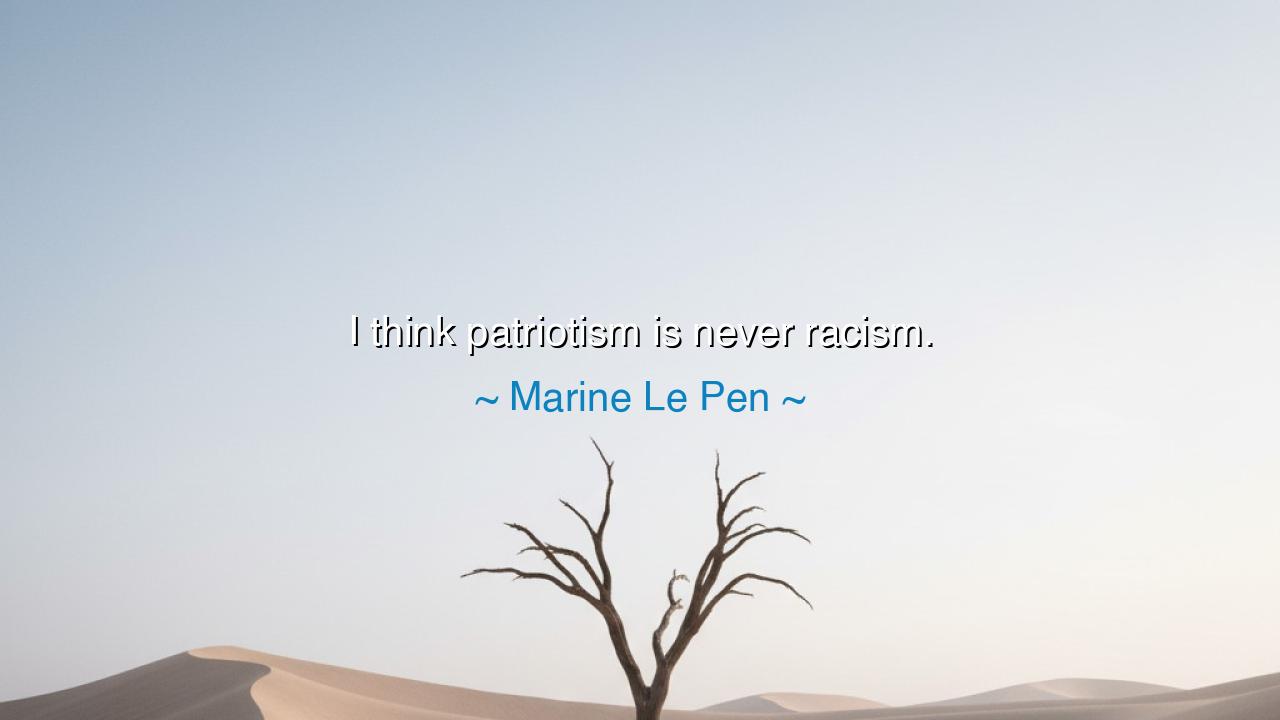
I think patriotism is never racism.






The stateswoman Marine Le Pen once declared with resolute simplicity: “I think patriotism is never racism.” In these words lies a distinction that is both urgent and timeless: patriotism is the love of one’s country, rooted in loyalty, service, and the protection of shared values, while racism is the corrosion of the human soul, a devotion twisted into hatred and exclusion. Patriotism uplifts a nation through unity and responsibility; racism tears it apart through fear, division, and cruelty. Le Pen reminds us that true love of country is moral and inclusive, not a pretext for prejudice.
In the wisdom of the ancients, love of one’s polis or land was inseparable from justice and virtue. The Greek and Roman philosophers warned that pride in one’s city, tribe, or nation must never overshadow respect for humanity. To allow discrimination to masquerade as devotion was considered hubris, a moral blindness that would eventually lead to ruin. Le Pen’s observation echoes this ancient teaching: patriotism is ennobling when guided by principle, but it becomes corruption when entangled with hatred for those who differ.
History offers stark examples of this truth. In Nazi Germany, loyalty to the nation was perverted into a doctrine of racial hatred. Citizens were encouraged to see the state’s interest as inseparable from the subjugation of others. What masqueraded as patriotism was in fact racism, and the consequences were catastrophic. Millions of lives were destroyed, and the moral foundation of the nation crumbled. Le Pen’s words stand as a caution: patriotism, when untethered from justice and humanity, loses its virtue and becomes a weapon of oppression.
By contrast, examples of inclusive patriotism illuminate the nobility of devotion without prejudice. Consider the leaders of the Abolitionist Movement in the United States, who loved their country yet demanded that it live up to its highest ideals. Figures like Frederick Douglass and Sojourner Truth exhibited fierce loyalty to the promise of liberty while challenging the systemic racism of their time. Their patriotism was active, moral, and courageous; it sought to heal and elevate the nation rather than divide it. This is the essence of what Le Pen articulates: patriotism is never righteous if it becomes racism.
The meaning of her quote is clear: loyalty to one’s homeland must never be a license to hate. Patriotism is a force for unity, shared purpose, and the flourishing of all citizens. Racism, in contrast, is a force of destruction, eroding trust, community, and the very ideals that make a nation worthy of love. True patriotism celebrates a nation’s values, honors its history, and works to improve its future—without denigrating those who are different.
From this insight emerges a vital lesson: to love one’s country is to act in ways that uphold justice, equality, and respect. One cannot claim devotion to a nation while oppressing or excluding fellow human beings. Patriotism is measured not by who is kept out, but by who is embraced, protected, and honored. When the love of country becomes entangled with racial hatred, it ceases to be patriotism and becomes betrayal of the nation’s moral foundation.
Practically, this teaching calls every citizen to cultivate vigilance, empathy, and moral clarity. Speak out against discrimination, challenge policies and rhetoric that divide, and embrace the principle that patriotism is never racism. Support initiatives that strengthen communities, protect rights, and promote inclusion, remembering that the strength of a nation lies in the dignity and equality of all its people.
Thus, Le Pen’s words endure as both warning and inspiration: true patriotism unites, uplifts, and defends shared values, while racism destroys the soul of the nation. Love of country must be inseparable from justice, and loyalty must be measured not by exclusion, but by the courage to ensure that all citizens can thrive together. In this union of devotion and morality, the nation finds its highest expression and its enduring honor.






AAdministratorAdministrator
Welcome, honored guests. Please leave a comment, we will respond soon